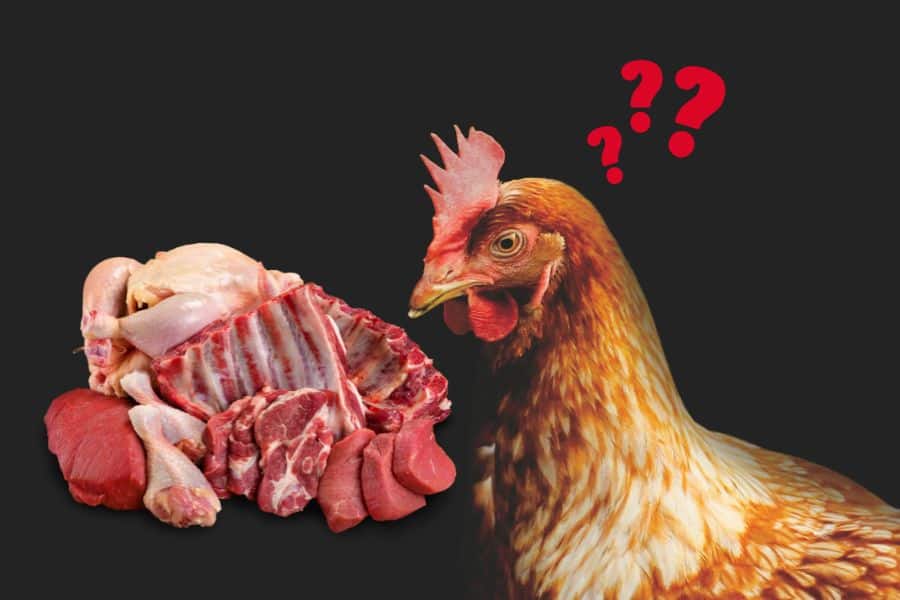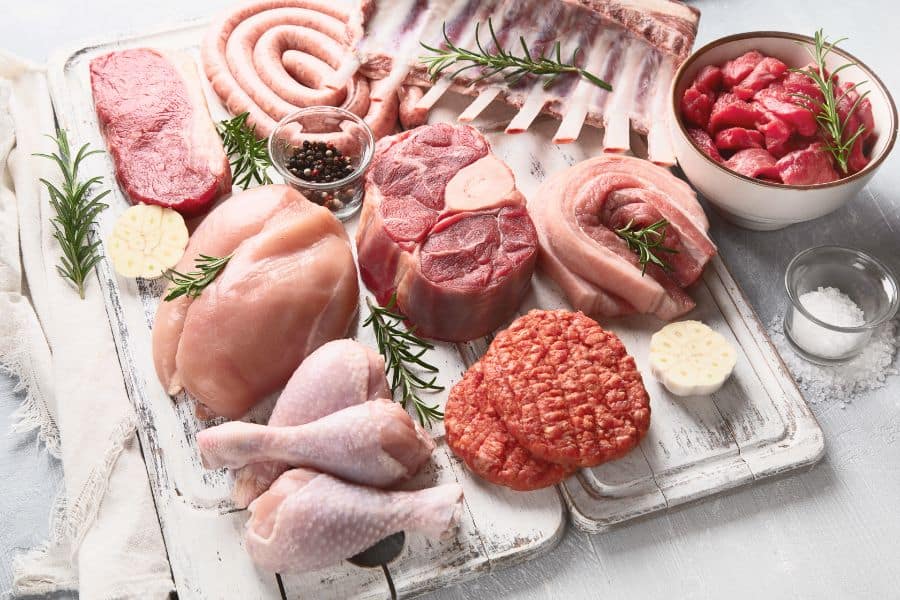Chickens are an all-devouring species which means they will eat food that is of both animal and plant origin. If you have ever looked after a flock of hens, you definitely noticed it – no matter the origin of the matter, they will eat it.
Since meat is animal flesh, chickens can and will eat it (regardless of whether they live in the wild or on a farm).
But there are a lot of types of meat. Should chickens be eating all of them? If not, which ones are on the approved list? And there’s also the possibility of feeding chickens raw, cooked, or processed meat. Are all three of them okay?
To learn answers to all of these questions and everything else that is related to chickens eating meat, please keep us company for the duration of this article.
Is Meat Good for Chickens?
We answered the question “Can chickens eat meat” when we said they’re omnivores.
But just because an animal can eat something doesn’t automatically mean it should, right? So, should chickens eat meat? Is meat good for chickens? Well, the short answer is yes.
The longer answer is yes, meat is good for chicken, but it shouldn’t make up for a large part of their diet. After all, meat is a treat, and as you know, treats are supposed to make for about one-tenth of the flock’s diet.
The main reason you shouldn’t give your flock too much meat, despite its many benefits we’ll discuss shortly, is that meat contains lots of protein and fats. These two nutrients are obviously necessary for chickens’ proper health, but if consumed in excess, they could lead to problems such as kidney failure, obesity, or death.
Before we talk about meat benefits for chickens, we have to note that we won’t be differentiating between types of meat since there are too many different animals (cow, fish, worm, pig, lamb, cattle, oyster, etc.).
These different meats also have non-identical nutritional values. For example, in 100 grams of mealworms, there are 20.3 grams of protein, while 100 grams of pork contains 27 grams of protein.
Still that doesn’t change the fact that both of these meat types are high in protein, which, as we’ll see shortly, is a nutrient that plays an important role in the life of a chicken.
Meat Helps Chickens Moult Properly
For those of you who might not know, molting is the process of shedding old and growing new feathers in birds. Chickens and other molting birds do it in the autumn as a preparation for the winter.
Due to lots of wear and tear that their feathers endure from one molting session to another, birds would have a hard time surviving cold winter months without doing this.
Feathers are primarily made up of protein (at least 85%), so food that is high in protein in the molting periods is a must.
Another thing chickens are in need of when they’re changing their feathers is fats or lipids, as they are also known. And which type of food is most famous for containing lots of proteins and fats? Of course, it’s meat.
So, while you can treat your chicken with some meat during the whole year for the reasons we’ll list shortly, giving it to them when they’re molting is imperative.
Meat Ensures Proper Egg Production
In order for chickens to lay eggs, they need to spend extra resources. The most important of those resources is protein. On average, chickens need an extra 17% of protein added to their diet for them to be able to support egg production. And the best way to ensure they will get it is to feed them meat.
Meat Helps Chickens Deal with Stress
A chicken’s life may seem like an easy one: lay an egg, eat, walk around, sleep, repeat.
But a lot can happen during and in between these acts: predator attacks, high/low temperatures, health issues, run-ins with other flock members, etc. All of the things we just mentioned are (highly) stressful events that will take a toll on your chicken. And you surely know that a stressful hen isn’t something you want to have around.
To deal with stress successfully, chickens need certain nutrients such as protein, vitamin B, omega-3 fatty acids, zinc, and copper. Meat is high in all of the above, which is why you should increase your hens’ meat intake during or after stressful events.
Meat Boosts the Chickens’ Immune System
Meat is a great source of energy, protein, iron, zinc, copper, and vitamins B1, B6, and B12 – all nutrients that help the immune system defend itself against parasites and illnesses.
Meat Keeps the Chickens Warm During the Winter
The feathers are the first line of defense against the low temperature.
But that isn’t the only thing chickens use to keep themselves warm – there’s also a layer of fat doing a lot of the heavy lifting. And the body needs more energy, in general, to keep the metabolism up and running at an optimal temperature.
All of this means that chickens need extra carbs, proteins, and fats during the winter, which can all be found in meat.
Can Chickens Eat Raw Meat?
Have you ever seen a flock of chickens gather on a Sunday to roast all those worms, mice, and snakes they caught during the week? Neither did we.
But what we and anyone who has owned chickens at any point in their life definitely saw is hens pecking away and munching on crickets, grasshoppers, and the aforementioned worms, mice, and snakes. All this is to say that chickens can eat raw meat.
One thing to remember if you give raw meat is that it should always be fresh and clean. Rotten, decaying, bad-smelling, or raw meat starting to change its color shouldn’t be on the menu!
Can Chickens Eat Processed Meat?
Processed meat is all around us: enter any supermarket, and you’ll see loads of processed meat products on the shelves. And it’s quite cheap! In fact, it’s usually a lot cheaper than non-processed meat, which is why some poultry farmers add it to their chickens’ diet.
But there is a reason for that affordability: processed meat is basically made from throw-away parts of animals.
Since these parts usually don’t taste that good, a lot of sugars, fats, salts, sodium, additives, and similar ingredients are added. The interesting thing is that chickens actually need a lot of these elements to function properly.
But only in appropriate doses. Unfortunately, processed meats contain too much of everything to be safe for chicken consumption, so you shouldn’t give it to your flock, especially the highly processed variety of processed meat.
Can Baby Chickens Eat Meat?
You might wonder what’s up with the flock’s youngest and most vulnerable members: can and should baby chickens eat meat? We listed all the benefits meat has on chicken’s health, so one might think it appropriate to give it to the youngins as well.
But, as is usually the case in the animal kingdom, the youngest have different nutrition needs than the adult specimens, and baby chickens are no different. Although they can eat meat, you shouldn’t feed it to them.
As we already said, meat is high in protein, so considering how tiny baby chicks are, it could really damage their kidneys. The best thing you can do for them is keep them on the starter feed.
And don’t worry about them missing out on treats – their mothers will start giving it to them just a few days after hatching and may even slip a piece of worm here and there.
Can Chickens Eat Chicken?
Just reading the question we have just posed might make a lot of people (slightly) uncomfortable because their brain immediately goes to: “How can any animal eat a member of the same species?”
But when it comes to chicken eating chicken, we shouldn’t be thinking about ourselves, our feelings, or our customs – what importance do they have for chickens? The truth of the matter is that chickens can eat chicken.
Of course, cannibalism among chickens isn’t widespread, but it also isn’t nonexistent – in the “right” circumstances, chickens eat other chickens, sometimes even the ones that are from the same flock.
For example, if they’ve gone without food for a long time, chickens might kill a flock member who is towards or at the bottom of the pecking order.
Another situation where you might naturally encounter chicken cannibalism is when one of the chickens dies or gets killed by another animal but doesn’t get eaten. In case other chickens are hungry at that moment, they will eat the dead member.
So, if hens eating hens is a naturally occurring event, it’s also totally appropriate for you to feed them some tasty chicken meat.
Can Chickens Eat Cooked Chicken?
As we saw in the previous section, chickens can eat chicken, so there isn’t any issue in you giving the flock cooked chicken. In fact, if you have the option, always go for the cooked version instead of raw chicken because the raw version is known to be
the source of certain bacterial contaminations, such as salmonella.
Can Chickens Eat Pork?
A lot of farmers aren’t sure whether chickens can be fed pork because pigs aren’t known to be tidy animals with super clean diets.
Still, since many people consume pork as a part of their own diet, it’s totally normal to assume that chickens can eat it as well. And that assumption is correct because pork isn’t that much different from chicken or beef when it comes to nutritional value, benefits, and drawbacks for chickens.
All the nutritional values of pork are out of the scope of this article, and we already talked about the meat benefits in the beginning, so we’ll shortly discuss a potential drawback that excessive pork consumption may have on chicken health.
Pork is a great source of nutrients such as protein, vitamin B, thiamin, and omega-3 fatty acids, which chickens need in their diet.
The problem that pork has is that its high in fat. Since chickens can’t store the fat surplus effectively but rather in the vicinity of their liver and belly, which affects their health negatively in the long run, you shouldn’t give them too much pork. It’s perfectly okay as an every-once-in-a-while treat, though.
Also, remember what we said in some of the previous sections: no processed meat, no old/rotten meat, cooked over raw meat. All of this applies to pork as well.
Can Chickens Eat Beef?
The last popular meat type we’ll talk about is beef. Beef is red meat like pork which means it contains high levels of fat. And as we already stated, too much fat means problems for chickens.
But don’t disregard beef just yet. Let’s keep in mind the high protein, carbs, vitamin B6 and B12, and iron amounts beef has and remember that all of them are vital for a chicken to maintain a healthy lifestyle.
So, whether it’s steak, fat, stew, jerky, or liver, your hen can and should eat beef. With two caveats: provide the beef in moderation and choose cooked over raw variety.
Also Read:
Conclusion
So, now we know that chickens can eat meat. Whether it’s chicken, beef, pork, or other types of meat, chickens should have animal flesh on their menu.
Protein, fats, vitamins, and minerals found in meat are all too important and abundant for you to try to provide them exclusively from other types of food. The important thing is not to overdo it: treat the meat as a treat.


